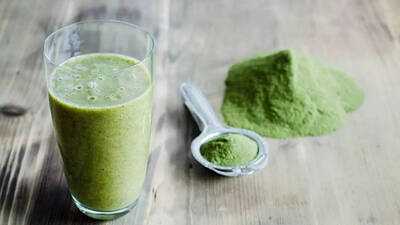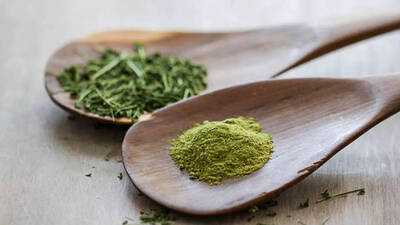Nature, verified by science for human health, can do miracles, as the two have been partnering with each other for years. One such natural element that even science attests is effective for health is Moringa.
Also known as Miracle tree, the plant is a short-lived, fast-growing tree widely cultivated in India and parts of Asia, Africa and Central and South America. In the form of fresh leaves, powder, capsules and oil, moringa is used as a medicinal herb by people across the world.
From anti-oxidant properties to liver protection, below are 7 science-backed health benefits of consuming Moringa.
Nutrient powerhouse

Moringa is described as a "superfood" due to its high quantity of vitamins and minerals. Its leaves have 18.9 mg Vitamin A per 100 g, it has seven times more Vitamin C than oranges and has 17.3 mg of the nutrient per 100 g, 20.5 mg Vitamin B per 100 g, 28.2 mg iron per 100 g, 2,003 mg calcium per 100 g, 204 mg potassium per 100 g, 368 mg magnesium per 100 g and 3.29 mg zinc per 100 mg, according to a review article published in the International Journal of Community Medicine and Public Health.
Anti-oxidant and anti-inflammatory activity
The presence of bioactive compounds such as glycosylates, flavonoids, isothiocyanates and thiocarbamates makes Moringa a highly effective antioxidant. Additionally, its parts such as leaf, pods, flowers and roots have active compounds such as tannins, phenols, flavonoids, vanillin and moringin, known to have anti-inflammatory properties, as per the National Library of Medicine. Both of these help neutralise free radicals, reduce cellular damage and lower chronic inflammation.
Lowering blood glucose levels

Moringa leaves proved to have excellent results in the glucose tolerance of Wistar and Goto-Kakizaki rats. The aqueous extract in it has anti-diabetic effects that control blood glucose levels, protein, sugar and haemoglobin. Its leaves are known to lower glucose levels within three hours of intake.
Improves heart health
The aqueous and alcoholic extracts of Moringa have cardioprotective effects. It improves levels of enzymes such as SOD, catalase and more. In hypertensive rats, the leaves of the plant lowered cholesterol levels as well.
Liver-protective effects

Quercetin in the flowers of the plants is known to have protective effects on the liver. The methanolic extract also presented changes in hepato-renal and haematological profiles. Consuming moringa extract for 21 days regularly was proven to significantly reduce liver injury due to various flavonoids present in it.
Weight loss
In a study, eating moringa leaf powder for 49 days significantly reduced body mass index in rats suffering from hypercholesterolemia. This was because the powder reduced the expression of hormones such as resistin and leptin and improved the body's lipid profile by reducing body weight.
Digestive properties

Moringa extract is proven to reduce free radicals and neutralise the acidic effects of gastric juice. It also prevents the formation of gastric ulcers by increasing capillary resistance and improving microcirculation, leading to less cell injury.
Also known as Miracle tree, the plant is a short-lived, fast-growing tree widely cultivated in India and parts of Asia, Africa and Central and South America. In the form of fresh leaves, powder, capsules and oil, moringa is used as a medicinal herb by people across the world.
From anti-oxidant properties to liver protection, below are 7 science-backed health benefits of consuming Moringa.
Nutrient powerhouse
Moringa is described as a "superfood" due to its high quantity of vitamins and minerals. Its leaves have 18.9 mg Vitamin A per 100 g, it has seven times more Vitamin C than oranges and has 17.3 mg of the nutrient per 100 g, 20.5 mg Vitamin B per 100 g, 28.2 mg iron per 100 g, 2,003 mg calcium per 100 g, 204 mg potassium per 100 g, 368 mg magnesium per 100 g and 3.29 mg zinc per 100 mg, according to a review article published in the International Journal of Community Medicine and Public Health.
Anti-oxidant and anti-inflammatory activity
The presence of bioactive compounds such as glycosylates, flavonoids, isothiocyanates and thiocarbamates makes Moringa a highly effective antioxidant. Additionally, its parts such as leaf, pods, flowers and roots have active compounds such as tannins, phenols, flavonoids, vanillin and moringin, known to have anti-inflammatory properties, as per the National Library of Medicine. Both of these help neutralise free radicals, reduce cellular damage and lower chronic inflammation.
Lowering blood glucose levels
Moringa leaves proved to have excellent results in the glucose tolerance of Wistar and Goto-Kakizaki rats. The aqueous extract in it has anti-diabetic effects that control blood glucose levels, protein, sugar and haemoglobin. Its leaves are known to lower glucose levels within three hours of intake.
Improves heart health
The aqueous and alcoholic extracts of Moringa have cardioprotective effects. It improves levels of enzymes such as SOD, catalase and more. In hypertensive rats, the leaves of the plant lowered cholesterol levels as well.
Liver-protective effects
Quercetin in the flowers of the plants is known to have protective effects on the liver. The methanolic extract also presented changes in hepato-renal and haematological profiles. Consuming moringa extract for 21 days regularly was proven to significantly reduce liver injury due to various flavonoids present in it.
Weight loss
In a study, eating moringa leaf powder for 49 days significantly reduced body mass index in rats suffering from hypercholesterolemia. This was because the powder reduced the expression of hormones such as resistin and leptin and improved the body's lipid profile by reducing body weight.
Digestive properties
Moringa extract is proven to reduce free radicals and neutralise the acidic effects of gastric juice. It also prevents the formation of gastric ulcers by increasing capillary resistance and improving microcirculation, leading to less cell injury.
You may also like

Private investigator shares major cheating sign that 'everyone misses'

James Maddison to miss majority of season as Tottenham learn devastating injury blow

All the signs Arctic Monkeys are making huge comeback

Netflix fans all watching 'best war movie since Saving Private Ryan' based on incredible true story

Katie Price fumes 'I'm very upset' as she breaks silence on Princess rift







